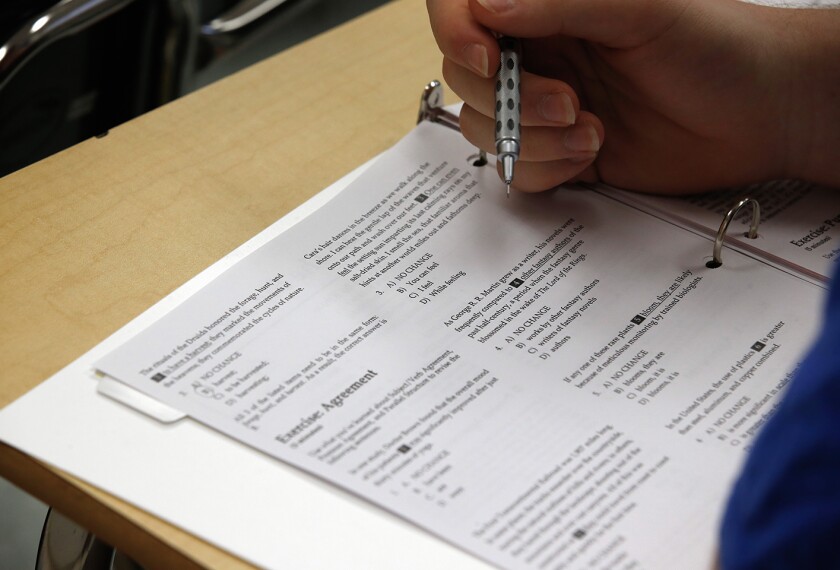While thousands of Massachusetts students sweated through two weeks’ worth of tough state assessments this spring, scattered groups of protesters decided that rather than take the tests, they’d test the system.
When the second round of the Massachusetts Comprehensive Assessment System, or MCAS, was administered beginning in April, some 215,000 4th, 8th, and 10th graders took the tests. But in several areas, pockets of students sat them out or waged protests. Students who did not take the tests received a zero, which is factored into their schools’ aggregate scores.
Some students said they believed the tests have come to dominate the education process.
“Basically, the whole school year has been about that test,” said Alex Sommerfeld, a sophomore at Danvers High School in Danvers. The honors student and six of his classmates refused to take the exams; instead, they spent 20 or so hours in the school library reading an assigned book. “It’s invalid and a waste of time,” Mr. Sommerfeld contended. “Everyone was talking about it. I said someone should do something about it.”
Through local news reports and the Internet, Mr. Sommerfeld and his confederates soon learned they were not the only ones unwilling to sit for the rigorous English, mathematics, science, and social studies exams. Citing similar fairness and time issues at a news conference in May, 17 sophomores at Cambridge Rindge and Latin School skipped the exams.
Several parents at Cambridgeport Elementary School kept their children home on the days when the tests were administered. And, after learning of widespread concerns about the tests, the principal of Boston’s Young Achievers School, a pilot school, gave parents and students the option of not taking it.
Field Trip Itinerary
Meanwhile, a group of high school students in Newton took the exams but petitioned against them. The students, who call themselves the Massachusetts Coalition of Active Students, also led a series of after-school field trips around Boston to illustrate what they considered better ways of spending their time.
At the end of the testing periods, they mailed a summary of their itinerary and what they had learned to local school officials and state Commissioner of Education David P. Driscoll.
“The test isn’t helping education, it’s destroying it,” said Julia Kleyman, 15, a sophomore and honors student at Newton North High School, who organized the coalition. “MCAS has been really destructive to the curriculum. It’s much less flexible.”
Most of the protesters say their efforts to rally students and protest against the tests taught them important lessons in civil disobedience. Students wrote and phoned their state representatives, picketed at the state Capitol, and sent faxes to news organizations.
Little Gained
But school officials, who argue that the test is fair, valid, and a crucial part of the state’s efforts to instill high educational standards, say little was gained.
Commissioner Driscoll “has no sympathy” for the protesters, said Jan Feldman, a state education department spokeswoman. “Ninety-nine percent of the students in Massachusetts played by the rules. These students need to learn responsibility.”
But that position concerns some groups and teachers who, like the protesters, believe MCAS has taken on a life of its own.
“MCAS is now determining education in Massachusetts, and it was never intended to do that,” argued Karen Hartke, a project director for the National Center for Fair & Open Testing, or FairTest, a Cambridge-based group that strongly opposes most standardized and high-stakes testing.
“There’s a lot of concern about the length of the test and the time [that] it’s taking away from learning,” she said. But, “there’s a real unwillingness on the part of officials to listen to their constituents. Reasonable arguments about the tests continue to go unheard.”
Officials shouldn’t “discount them as kids whining about tests ‘as kids will do,’” Julie Craven, a teacher at King Open School in Cambridge, said last week via e-mail. “These are poorly designed tests that at best are a waste of time and at worst damage the curriculum and confidence--both essential for learning.”



